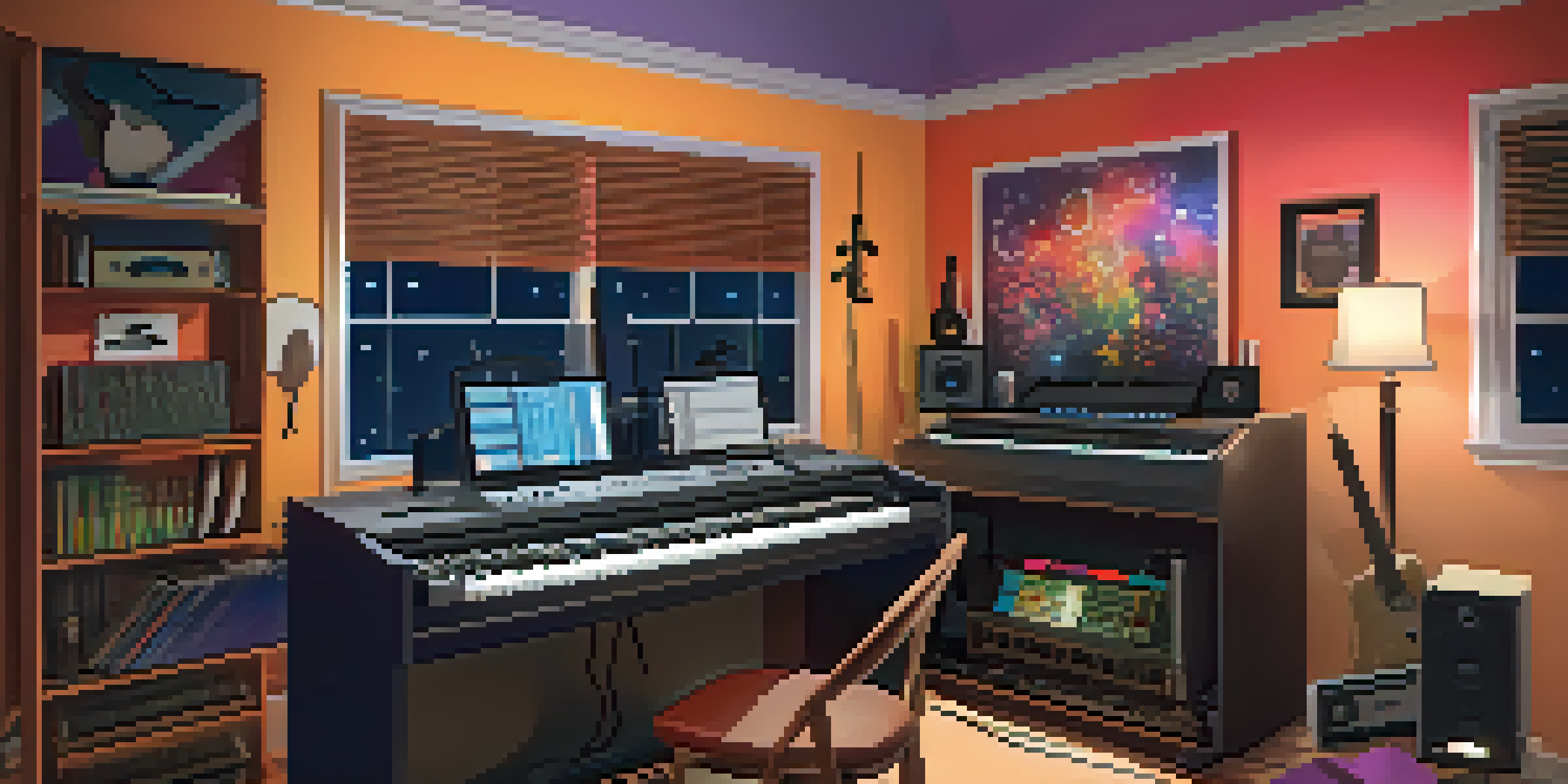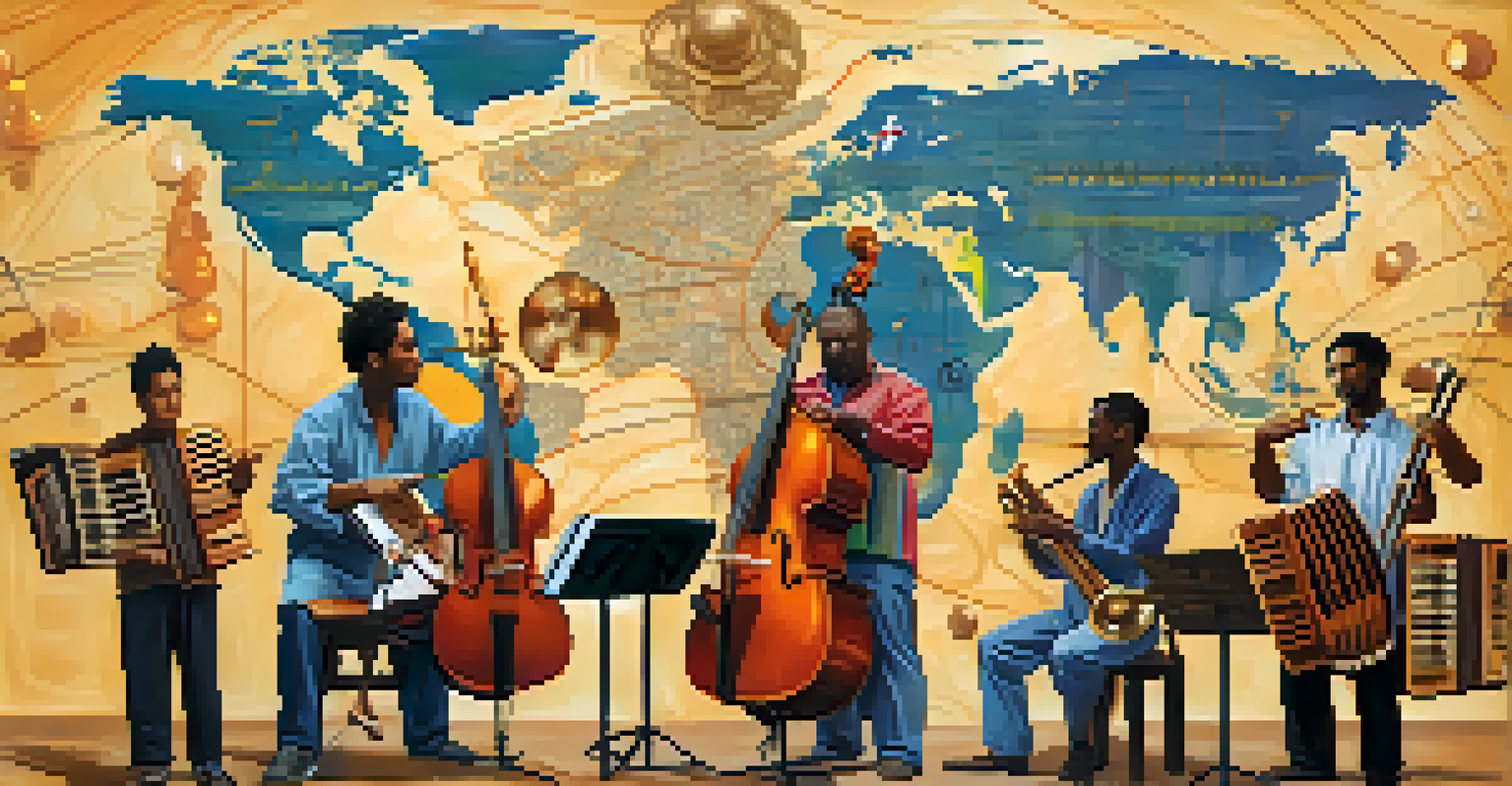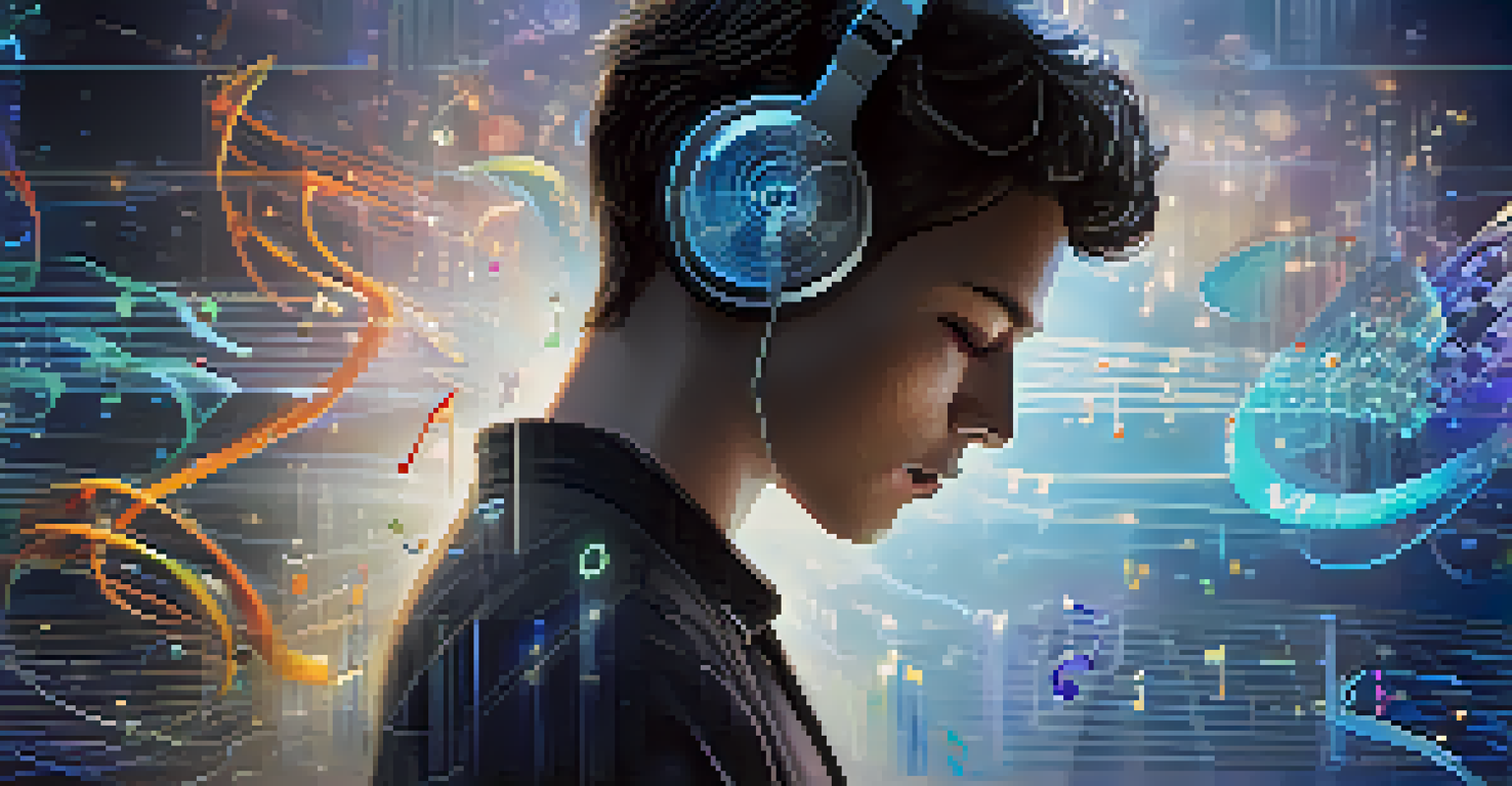Soundtrack Trends: How Digital Media is Shaping Composition

The Rise of Digital Platforms in Music Composition
In recent years, digital platforms have dramatically changed how music is composed. Composers now have the ability to share their work instantly on platforms like SoundCloud or Spotify, reaching global audiences without the need for traditional gatekeepers. This shift not only democratizes music but also encourages collaboration and experimentation among musicians from diverse backgrounds.
Music can change the world because it can change people.
Moreover, these platforms provide valuable data insights, allowing composers to understand listener preferences and trends. For instance, a composer might notice that cinematic scores with orchestral elements are gaining popularity, prompting them to explore this style in their next project. This data-driven approach helps artists stay relevant in a rapidly changing landscape.
Additionally, the accessibility of digital tools and software has lowered the barrier to entry for aspiring composers. Programs like GarageBand and Ableton Live allow anyone with a passion for music to create high-quality soundtracks, fostering a new generation of creators who might not have had access to traditional music education.
The Influence of Streaming Services on Soundtrack Creation
Streaming services have redefined how soundtracks are consumed and perceived, influencing composers in profound ways. Playlists curated by algorithms often dictate the type of music that gains popularity, encouraging composers to create tracks that fit specific moods or genres. This shift means that soundtracks are now often designed with the streaming experience in mind, aiming to capture listeners’ attention within the first few seconds.

Moreover, the rise of binge-watching on platforms like Netflix has led to a demand for longer, more immersive soundtracks that can accompany entire series. Composers are now crafting themes that can evolve throughout multiple episodes, creating a deeper connection between the audience and the narrative. This serialized approach allows for more intricate storytelling through music, enhancing the overall viewing experience.
Digital Platforms Empower Composers
Digital platforms like SoundCloud and Spotify allow composers to share their work globally, fostering collaboration and creativity.
As a result, composers are adapting their styles to fit the needs of these platforms, often blending traditional orchestral elements with modern electronic sounds. This fusion not only showcases their versatility but also resonates with a wider audience, making soundtracks more appealing to a diverse demographic.
The Role of Social Media in Music Promotion
Social media has become a powerful tool for promoting soundtracks, allowing composers to directly engage with their audience. Platforms like TikTok and Instagram enable musicians to share short clips of their work, creating buzz and anticipation for upcoming releases. This instant feedback loop helps composers gauge public interest and tailor their music accordingly.
The future of music is not in the hands of the few; it’s in the hands of the many.
Additionally, social media allows for collaborations between composers and influencers, further amplifying their reach. For example, a popular content creator might use a composer’s track in their video, exposing the music to thousands of new listeners. This organic promotion often leads to increased streams and downloads, showcasing the symbiotic relationship between digital media and music.
Furthermore, the ability to share behind-the-scenes content engages fans on a personal level, making them feel invested in the creative process. Composers can post updates about their projects, share stories about their inspiration, and even interact with fans, fostering a community around their music.
Emerging Technologies Shaping Soundtrack Composition
Technological advancements are at the forefront of modern soundtrack composition, with innovations like artificial intelligence (AI) changing the game. AI tools can now assist composers by generating melodies or suggesting chord progressions, streamlining the creative process. This technology allows composers to focus more on the emotional aspects of their work, rather than getting bogged down in technicalities.
Moreover, virtual reality (VR) and augmented reality (AR) are creating new opportunities for immersive sound experiences. Composers are now exploring how to score for environments where sound can surround the listener, enhancing storytelling in gaming and film. This shift towards spatial audio presents exciting challenges and possibilities for sound design.
Streaming Services Shape Soundtracks
Streaming services influence the creation of soundtracks, encouraging composers to design music that captures listener attention quickly.
As these technologies continue to evolve, they will undoubtedly influence future compositions, encouraging composers to experiment with new formats and styles. The fusion of traditional composition techniques with cutting-edge technology promises a rich and diverse future for soundtracks.
The Impact of Globalization on Music Composition
Globalization has opened doors for composers to incorporate diverse musical influences into their soundtracks. Today, a composer might blend Western orchestral sounds with traditional instruments from various cultures, creating a unique auditory experience. This fusion not only enriches the music but also reflects the interconnectedness of our increasingly global society.
For example, the popularity of films like 'Coco' and 'Black Panther' has highlighted the importance of incorporating authentic cultural elements into soundtracks. Composers are now more aware of their responsibility to represent these influences respectfully and accurately, leading to collaborations with artists from different backgrounds. This approach not only enhances the soundtrack but also fosters cultural appreciation.
Moreover, as composers draw inspiration from a wider range of musical traditions, audiences are exposed to new sounds and styles. This diversity in composition can lead to a richer listening experience, encouraging listeners to explore genres they may not have encountered otherwise.
The Evolution of Audience Engagement through Music
Audience engagement has evolved significantly in the digital age, with composers now actively seeking to connect with listeners. Through live-streamed performances, Q&A sessions, and interactive social media campaigns, composers can create a more personal relationship with their audience. This engagement fosters a sense of community, enhancing the overall experience of consuming soundtracks.
Additionally, the rise of fan-driven content, such as remixes and covers, allows listeners to become part of the creative process. When fans take a composer’s original work and put their spin on it, it not only showcases their talent but also promotes the original soundtrack. This collaborative spirit can lead to a wider appreciation for the music and the composer.
Emerging Tech Transforms Composition
Technological advancements, such as AI and immersive audio, are reshaping how soundtracks are composed and experienced.
Furthermore, composers are increasingly utilizing listener feedback to inform their future projects. By paying attention to what resonates with their audience, they can tailor their compositions to better align with listener preferences while still staying true to their artistic vision.
The Future of Soundtrack Composition in a Digital Era
As we look to the future, it's clear that digital media will continue to shape the landscape of soundtrack composition. Composers will likely embrace emerging technologies and trends, pushing the boundaries of what is possible in music creation. The integration of AI, immersive audio experiences, and global influences will pave the way for innovative and diverse soundtracks.
Moreover, as audience engagement becomes increasingly integral to the creative process, composers will need to adapt their strategies for promotion and connection. The emphasis on building relationships with listeners will not only enhance the experience of consuming soundtracks but also create a loyal fanbase that supports their work.

Ultimately, the evolution of soundtrack composition in this digital age promises exciting opportunities for creativity and collaboration. By embracing change and staying attuned to audience preferences, composers can ensure their music remains relevant and impactful for years to come.